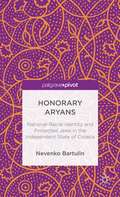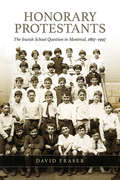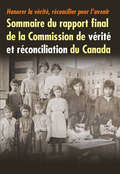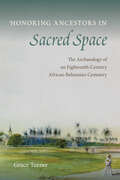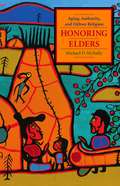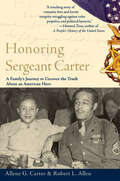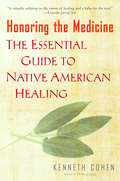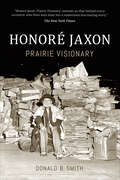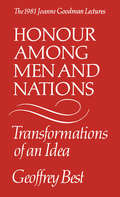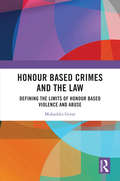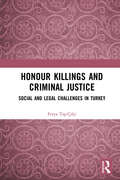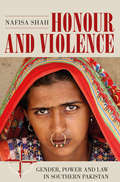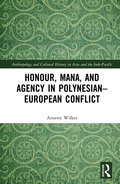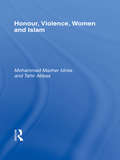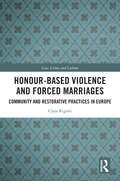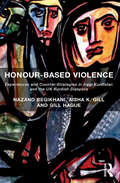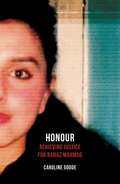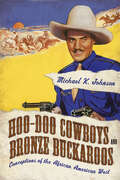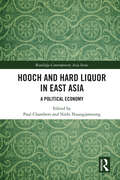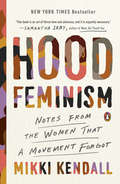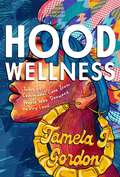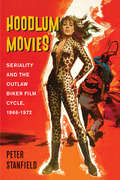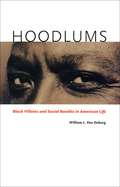- Table View
- List View
Honorary Aryans: National–Racial Identity and Protected Jews in the Independent State of Croatia
by Nevenko BartulinBetween 1941 and 1945, in one of the more curious episodes of racial politics during the Second World War, a small number of Jews were granted the rights of Aryan citizens in the Independent State of Croatia by the pro-Nazi Utasha regime. This study seeks to explain how these exemptions from Ustasha racial laws came to be, and in particular how they were justified by the race theory of the time. Author Nevenko Bartulin explores these questions within the broader histories of anti-Semitism, nationalism, and race in Croatia in the late nineteenth and early twentieth century, tracing Croatian Jews' troubled journey from "Croats of the Mosaic faith" before World War II to their eventual rejection as racial aliens by the Utasha movement.
Honorary Protestants
by David Fraser The Osgoode SocietyWhen the Constitution Act of 1867 was enacted, section 93 guaranteed certain educational rights to Catholics and Protestants in Quebec, but not to any others. Over the course of the next century, the Jewish community in Montreal carved out an often tenuous arrangement for public schooling as "honorary Protestants," based on complex negotiations with the Protestant and Catholic school boards, the provincial government, and individual municipalities. In the face of the constitution's exclusionary language, all parties gave their compromise a legal form which was frankly unconstitutional, but unavoidable if Jewish children were to have access to public schools. Bargaining in the shadow of the law, they made their own constitution long before the formal constitutional amendment of 1997 finally put an end to the issue.In Honorary Protestants, David Fraser presents the first legal history of the Jewish school question in Montreal. Based on extensive archival research, it highlights the complex evolution of concepts of rights, citizenship, and identity, negotiated outside the strict legal boundaries of the constitution.
Honorer la vérité, réconcilier pour l’avenir
by Commission de vérité et réconciliation du CanadaEntre 1867 et 2000, le gouvernement canadien a placé plus de 150 000 enfants autochtones dans des pensionnats d'un bout à l'autre du pays. <P><P>Les autorités gouvernementales et les missionnaires étaient d'avis qu'afin de « civiliser et de christianiser » les enfants autochtones, il fallait les éloigner de leurs parents et de leur communauté d'origine respective. <P> La vie de ces enfants au pensionnat était empreinte de solitude et d'exclusion. La discipline y était stricte et le déroulement du quotidien, lui, fortement régenté. Les langues et les cultures autochtones étaient dénigrées et réprimées. L'éducation et la formation technique prenaient trop souvent la forme de corvées et de tâches ménagères assurant l'autonomie des pensionnats. La négligence à l'égard des enfants fut institutionnalisée et le manque de supervision donna lieu à des situations où les élèves furent victimes de sévices physiques et sexuels. <P> Une poursuite judiciaire déposée par les anciens pensionnaires a mené, en 2008, à la mise sur pied de la Commission de vérité et réconciliation du Canada. Étant l'aboutissement de plus de six ans de recherche, le rapport final de la Commission présente l'histoire des pensionnats ainsi que leur héritage, et trace la voie de la réconciliation. <P> Honorer la vérité, réconcilier pour l'avenir résume les six volumes constituant le rapport final de la Commission. Il assimile les pensionnats à l'instrument d'un génocide culturel et indique, par le fait même, que ces pensionnats s'inscrivaient dans le cadre plus large de la politique colonialiste du gouvernement canadien à l'égard des peuples autochtones. <P> Le rapport établit de quelle façon le sous-financement chronique a mené à des conditions de vie malsaines et à des taux de mortalité bien plus élevés que ceux caractérisant le reste de la population canadienne d'âge scolaire. De plus, il indique clairement que le gouvernement avait été avisé des conséquences de ses politiques et que d'autres options lui avaient été proposées, options qu'il a choisi d'ignorer et qui auraient pourtant réduit le taux de mortalité au sein des pensionnats. Les perturbations que ces pensionnats ont causées aux élèves autochtones, à leur famille et aux collectivités sont encore palpables à ce jour. Elles se mesurent par la perte des langues et des liens familiaux dans les communautés autochtones, ainsi que par les écarts qui continuent de séparer les Autochtones et les non-Autochtones du Canada sur les plans de la santé, de l'éducation et de l'emploi. La réconciliation permettra de reconnaître que les pensionnats faisaient partie d'un ensemble plus large de politiques visant à priver les Autochtones de leurs terres, de leur culture, de leur vie spirituelle et de leurs propres gouvernements. Les quatre-vingt-quatorze appels à l'action de la Commission établissent des mesures concrètes à appliquer pour réparer la relation tourmentée qui unit les peuples autochtones à la Couronne, et pour établir des rapports harmonieux entre Autochtones et non-Autochtones.
Honoring Ancestors in Sacred Space: The Archaeology of an Eighteenth-Century African-Bahamian Cemetery (Florida Museum of Natural History: Ripley P. Bullen Series)
by Grace TurnerThe Anglican Church established St. Matthew's Parish on the eastern side of Nassau to accommodate a population increase after British Loyalists migrated to the Bahamas in the 1780s. The parish had three separate cemeteries: the churchyard cemetery and Centre Burial Ground were for whites, but the Northern Burial Ground was officially consecrated for nonwhites in 1826 by the Bishop of Jamaica. In Honoring Ancestors in Sacred Space, Grace Turner posits that the African-Bahamian community intentionally established this separate cemetery in order to observe non-European burial customs. Analyzing the landscape and artifacts found at the site, Turner shows how the community used this space to maintain a sense of social and cultural belonging despite the power of white planters and the colonial government.Although the Northern Burial Ground was covered by storm surges in the 1920s, and later a sidewalk was built through the site, Turner's fieldwork reveals a wealth of material culture. She points to the cemetery's location near water, trees planted at the heads of graves, personal items left with the dead, and remnants of food offerings as evidence of mortuary practices originating in West and Central Africa. According to Turner, these African-influenced ways of memorializing the dead illustrate W. E. B. Du Bois's idea of "double consciousness"--the experience of existing in two irreconcilable cultures at the same time. Comparing the burial ground with others in Great Britain and the American colonies, Turner demonstrates how Africans in the Atlantic diaspora did not always adopt European customs but often created a separate, parallel world for themselves. A volume in the Florida Museum of Natural History: Ripley P. Bullen Series
Honoring Elders: Aging, Authority, and Ojibwe Religion (Religion and American Culture)
by Michael D. McNallyLike many Native Americans, Ojibwe people esteem the wisdom, authority, and religious significance of old age, but this respect does not come easily or naturally. It is the fruit of hard work, rooted in narrative traditions, moral vision, and ritualized practices of decorum that are comparable in sophistication to those of Confucianism. Even as the dispossession and policies of assimilation have threatened Ojibwe peoplehood and have targeted the traditions and the elders who embody it, Ojibwe and other Anishinaabe communities have been resolute and resourceful in their disciplined respect for elders. Indeed, the challenges of colonization have served to accentuate eldership in new ways.Using archival and ethnographic research, Michael D. McNally follows the making of Ojibwe eldership, showing that deference to older women and men is part of a fuller moral, aesthetic, and cosmological vision connected to the ongoing circle of life-a tradition of authority that has been crucial to surviving colonization. McNally argues that the tradition of authority and the authority of tradition frame a decidedly indigenous dialectic, eluding analytic frameworks of invented tradition and naïve continuity. Demonstrating the rich possibilities of treating age as a category of analysis, McNally provocatively asserts that the elder belongs alongside the priest, prophet, sage, and other key figures in the study of religion.
Honoring Sergeant Carter: A Family's Journey to Uncover the Truth About an American Hero
by Robert L. Allen Allene CarterAllene Carter's father-in-law was a decorated veteran. Yet it was not until the Carter family received a call from the White House that she discovered he was a heroic force in the Rhineland campaign. President Clinton awarded the Medal of Honor to several black soldiers who served in World War II. Sergeant Edward A. Carter Jr. was among the recipients. Shocked to learn the extent of Carter's service, Allene was determined to uncover both the truth about her father-in-law's wartime record and why his official recognition was so long in coming.Here is the story not only of Sergeant Carter but also of his family's fight to restore his honor. Theirs is a journey that takes them from local veterans organizations to the office of the president and front pages of the national media. An important piece of American history, Honoring Sergeant Carter is an enduring story of determination and family love.
Honoring the Medicine: The Essential Guide to Native American Healing
by Kenneth S. CohenFor thousands of years, Native medicine was the only medicine on the North American continent. It is America’s original holistic medicine, a powerful means of healing the body, balancing the emotions, and renewing the spirit. Medicine men and women prescribe prayers, dances, songs, herbal mixtures, counseling, and many other remedies that help not only the individual but the family and the community as well. The goal of healing is both wellness and wisdom.Written by a master of alternative healing practices, Honoring the Medicine gathers together an unparalleled abundance of information about every aspect of Native American medicine and a healing philosophy that connects each of us with the whole web of life—people, plants, animals, the earth. Inside you will discover• The power of the Four Winds—the psychological and spiritual qualities that contribute to harmony and health• Native American Values—including wisdom from the Wolf and the inportance of commitment and cooperation• The Vision Quest—searching for the Great Spirit’s guidance and life’s true purpose• Moontime rituals—traditional practices that may be observed by women during menstruation• Massage techniques, energy therapies, and the need for touch • The benefits of ancient purification ceremonies, such as the Sweat Lodge• Tips on finding and gathering healing plants—the wonders of herbs • The purpose of smudging, fasting, and chanting—and how science confirms their effectivenessComplete with true stories of miraculous healing, this unique book will benefit everyone who is committed to improving his or her quality of life. “If you have the courage to look within and without,” Kenneth Cohen tells us, “you may find that you also have an indigenous soul.”
Honoré Jaxon: Prairie Visionary
by Donald SmithBorn in 1861 to a Methodist family, William Henry Jackson grew up in Ontario before moving to Prince Albert, Saskatchewan, where he sympathized with the Métis and became personal secretary to Louis Riel. After the Métis defeat a Regina court committed the young English Canadian idealist to the lunatic asylum at Lower Fort Garry. He eventually escaped to the United States, joined the labour union movement, and renounced his race. Self-identifying as Métis, he changed his name to the French-sounding “Honoré Jaxon” and devoted the remainder of his life to fighting for the working class and the Indigenous peoples of North America. In Honoré Jaxon, Donald B. Smith draws on extensive archival research and interviews with family members to present a definitive biography of this complex political man. The book follows Jaxon into the 1940s, where his life mission became the establishment of a library for the First Nations in Saskatchewan, collecting as many books, newspapers, and pamphlets relating to the Métis people as possible. In 1951, at age ninety, he was evicted from his apartment and his library discarded to the New York City dump. In poor health and broken in spirit, he died one month later. Heavily illustrated, Honoré Jaxon recounts the complicated story of a young English Canadian who imagined a society in which English and French, Indigenous and Métis would be equals.
Honour Among Men and Nations: Transformations of an idea
by Geoffrey BestTo no group subject to sociological and political analysis has honour seemed to matter more than to the military. Their idea of it has commonly been accepted as the most superior, open to emulation to the limited extent that different circumstances and purposes in non-military life permit.The degeneration of this concept and of the public realm in which honour's obligations have to be observed is the subject of this book, based on the 1981 Joanne Goodman Lectures at the University of Western Ontario.Best begins with the discovery, in the age of the American and French revolutions, of the nation as the supreme object of honourable service. He discusses how nationalism and democracy marched together through the nineteenth century to harden this creed and broaden its base, so that what had previously been a code for noblemen became a popular code for patriots.He finds that, in spite of the historical naturalness, even inevitability, of nationalism, its ensuing and corrective counter-current, internationalism, is a much more appealing principle. In internationalism, a tradition of cosmopolitan, transnational thought and activity, unmoved by the passions of nationalism and critical of them on the grounds of humanity and peace, he perceives a greater field for honourable service--honour's obligation to the service of mankind.Best casts new light upon some familiar historical episodes and values and suggests fruitful fields for future study.
Honour Based Crimes and the Law: Defining the Limits of Honour Based Violence and Abuse
by Mukaddes GorarHonour based violence and abuse manifests itself in different forms, and this book offers a comprehensive understanding of this phenomenon. This book argues that the limits of honour crimes must be defined more widely so that they include conducts and behaviours that originate from the patriarchal notion of honour, such as honour based oppression and breast ironing. The book provides a critical analysis and synthesis of the law in England and Wales and in the international human rights sphere. The relevant domestic legislation and cases are examined to reflect on whether adequate protection is provided for the victims and potential victims of honour based violence and abuse. Since honour based violence is a violation of human rights, the relevant international human rights law is examined to illustrate the perception of such crimes in the international arena. The effectiveness of any remedy for victims of honour based violence and abuse depends on its capability to change deep rooted behaviours in communities with honour based patriarchal values. This book argues that the law does not provide the effective impact required, in part due to patriarchal structures, and that more efforts should be dedicated to changes in education. It is held that there is a need for an educational programme that is especially designed to tackle violence and promote gender equality. The book will be essential reading for academics, researchers and policy-makers working in the areas of Human Rights Law, Criminal Law and Gender Studies.
Honour Killings and Criminal Justice: Social and Legal Challenges in Turkey
by Ferya Taş-ÇifçiDespite recent reforms to the Turkish Penal Code, the country retains a high level of honour-based violence. This book analyses the motives behind honour-based violence in Turkey and examines the criminal justice system’s approach to this type of crime. The work takes a socio-legal approach to explore the concepts of honour, patriarchy, and hierarchy, along with the roles of culture and tradition. It also examines how the legal system deals with this phenomenon, focusing on the decisions of the criminal courts in honour killing cases and drawing on prisoner interviews. These analyses show the extent to which the State follows a patriarchal approach when dealing with honour killings and inform recommendations for improving the legal and criminal justice system so as to deter crimes of this nature.
Honour and Violence: Gender, Power and Law in Southern Pakistan
by Nafisa ShahThe practice of karo kari allows family, especially fathers, brothers and sons, to take the lives of their daughters, sisters and mothers if they are accused of adultery. This volume examines the central position of karo kari in the social, political and juridical structures in Upper Sindh, Pakistan. Drawing connections between local contests over marriage and resources, Nafisa Shah unearths deep historical processes and power relations. In particular, she explores how the state justice system and informal mediations inform each other in state responses to karo kari, and how modern law is implicated in this seemingly ancient cultural practice.
Honour, Mana, and Agency in Polynesian-European Conflict (Anthropology and Cultural History in Asia and the Indo-Pacific)
by Annette WilkesFocusing on the era of "first encounters" in Polynesia, this book provides a fresh look at some of the early contacts between indigenous people and the captains and crew of European ships. The case studies chosen enable comparison of New Zealand Māori–European transactions with similar Pacific ones. The book examines the conflict situations that arose and the reasons for physical violence, highlighting the roles of honour, mana, and agency. Drawing on a range of archival materials, sailor and missionary journals, as well as indigenous narratives, Wilkes applies an analytical method typically used for examining much more recent conflict. She compares different ways of "seeing" and "knowing" the world and reflects on the reasons for poor decision-making amongst all the social actors involved. The evidence presented in the book strongly suggests that preventing violence – promoting and negotiating peace – happens most effectively when mana and honour are acknowledged between parties.
Honour, Violence, Women and Islam
by Mohammad Mazher IdrissWhy are honour killings and honour-related violence (HRV) so important to understand? What do such crimes represent? And how does HRV fit in with Western views and perceptions of Islam? This distinctively comparative collection examines the concept of HRV against women in general and Muslim women in particular. The issue of HRV has become a sensitive subject in many South Asian and Middle Eastern countries and it has received the growing attention of the media, human rights groups and academics around the globe. However, the issue has yet to receive detailed academic study in the United Kingdom, particularly in terms of both legal and sociological research. This collection sets out the theoretical and ethical parameters of the study of HRV in order to address this intellectual vacuum in a socio-legal context. The key objectives of this book are: to construct, and to develop further, a theory of HRV; to rationalise and characterise the different forms of HRV; to investigate the role of religion, race and class in society within this context, in particular, the role of Islam; to scrutinise the role of the civil/criminal law/justice systems in preventing these crimes; and to inform public policy-makers of the potential policies that may be employed in combating HRV.
Honour-Based Violence and Forced Marriages: Community and Restorative Practices in Europe (Law, Crime and Culture)
by Clara RigoniIn the last 20 years, the related phenomena of honour-based violence and forced marriages have received increasing attention at the international and European level. Punitive responses towards this type of violence have been adopted, including ad hoc criminalisation and legislation containing direct references to the concepts of honour, culture, and tradition. However, criminal law-based responses present several shortcomings and have often disregarded the specific needs that victims of such crimes might encounter. This book examines the possibility of using alternative programmes to address cases of honour-based violence and forced marriages. After reviewing previous existing literature, it presents new empirical data. Introducing a case study from the United Kingdom, the book recalls the debate on Sharia Councils and the Muslim Arbitration Tribunal, but examines instead other community-based secular programmes. By comparison, a study from Norway on the work of the National Mediation Agency and the so-called Cross-Cultural Transformative Mediation model is investigated as part of a larger multi-agency approach. Ultimately, in an attempt to reconcile pluralism and the rule of law, the book proposes effective ways to tackle honour crimes based on cooperation and individualisation of the proceedings, and capable of improving women’s access to justice and reducing secondary victimisation. The book will be essential reading for researchers and academics in Law, Criminology, Sociology, and Anthropology and for policy-makers and practitioners working with honour-based violence cases.
Honour-Based Violence: Experiences and Counter-Strategies in Iraqi Kurdistan and the UK Kurdish Diaspora
by Aisha K. Gill Nazand Begikhani’Honour'-based violence is a form of intimate violence committed against women (and some men) by husbands, fathers, brothers and male relatives. A very common social phenomenon, it has existed throughout history and in a wide variety of societies across the world, from white European to African cultures, from South and East Asia to Latin America. The most extreme form of Honour-based violence - 'honour' killing - tragically remains widespread. Over the last decade, national and international efforts, including new policy development and activist campaigns, have begun to challenge the practice. Based on a pioneering and unique study, conducted collaboratively by the Centre for Gender and Violence Research, University of Bristol, the University of Roehampton and Kurdish Women's Rights Watch, this book is at the forefront of this new and challenging policy direction.
Honour: Achieving Justice for Banaz Mahmod
by Caroline GoodeWhen Rahmat Sulemani reported his girlfriend Banaz missing, it quickly became clear to DCI Caroline Goode that something was very wrong. In fact, Banaz had contacted her local police station multiple times before, even listing the names of the men she expected to murder her in a so-called 'honour' killing. Her parents didn't seem worried, but Banaz had already accused them of being part of the plot.DCI Goode's team took on the investigation before they even had proof that a murder had taken place. What emerged was a shocking story of betrayal and a community-wide web of lies, which would take the team from suburban south London to the mountain ranges of Kurdistan, making covert recordings and piecing together cell phone data to finally bring the killers to justice.
Honrarás a tu padre
by Gay TaleseEl primer libro de no ficción que desveló los secretos de la Mafia y puso en jaque la vida de su autor, quien viajó a Sicilia y se infiltró en la intimidad de los Bonanno durante seis años. Una lluviosa noche de octubre de 1964, dos gánsteres secuestraron al famoso jefe mafioso Joseph Bonanno. A la mañana siguiente la policía neoyorquina informaba de su muerte. Un año después, Bonanno reapareció de forma misteriosa, y su vuelta desató una sangrienta disputa entre familias de la mafia. Esta obra monumental, que se lee como una trepidante novela «llena de detalles íntimos y fruto de una brillante labor periodística», se convirtió en un bestseller desde su publicación en 1971, fue llevada a la pantalla televisiva en miniseries de la CBS e incluso serviría de inspiración para crear Los Soprano. Ningún otro libro ha contribuido tanto a desvelar los secretos, la estructura, las guerras, las luchas de poder, las vidas familiares y las personalidades fascinantes y aterradoras de la mafia. Reseñas:«Un documento de un valor incalculable.»Wilfrid Sheed, The New York Review of Books «Brillante... Indispensable.»Robert Kirsch, Los Ángeles Times
Hoo-Doo Cowboys and Bronze Buckaroos: Conceptions of the African American West (Margaret Walker Alexander Series in African American Studies)
by Michael K. JohnsonHoo-Doo Cowboys and Bronze Buckaroos undertakes an interdisciplinary exploration of the African American West through close readings of texts from a variety of media. This approach allows for both an in-depth analysis of individual texts and a discussion of material often left out or underrepresented in studies focused only on traditional literary material. The book engages heretofore unexamined writing by Rose Gordon, who wrote for local Montana newspapers rather than for a national audience; memoirs and letters of musicians, performers, and singers (such as W. C. Handy and Taylor Gordon), who lived in or wrote about touring the American West; the novels and films of Oscar Micheaux; black-cast westerns starring Herb Jeffries; largely unappreciated and unexamined episodes from the "golden age of western television" that feature African American actors; film and television westerns that use science fiction settings to imagine a "postracial" or "postsoul" frontier; Percival Everett's fiction addressing contemporary black western experience; and movies as recent as Quentin Tarantino's Django Unchained.Despite recent interest in the history of the African American West, we know very little about how the African American past in the West has been depicted in a full range of imaginative forms. Hoo-Doo Cowboys and Bronze Buckaroos advances our discovery of how the African American West has been experienced, imagined, portrayed, and performed.
Hooch and Hard Liquor in East Asia: A Political Economy (Routledge Contemporary Asia Series)
by Paul Chambers Nithi NuangjamnongLiquor has become a “party” in East Asia – a beverage phenomenon popular among countries throughout the region. But, in fact, each country of East Asia has experienced a different evolution of spirits. Indeed, there is a liquor idiosyncrasy to each country of East Asia. Moreover, hooch is the popular alcoholic beverage for the lower classes while more sophisticated spirits are exclusive to the higher classes.The book examines liquor: moonshine and retail liquor in East Asia. It analyzes the following questions as to why liquor is becoming so popular in East Asia. Why is production of liquor in East Asia becoming so financially lucrative? Why has the production of hooch (moonshine) become so lucrative? In fact, the production and consumption of liquor in East Asian have become crucial as East Asia enters a period of craft liquor.A valuable resource for academics, students, and professionals interested in public policy, history, political economy, consumer goods in East Asia, and the evolution of hooch and hard liquor in East Asia.
Hood (Object Lessons)
by Alison KinneyObject Lessons is a series of short, beautifully designed books about the hidden lives of ordinary things. We all wear hoods: the Grim Reaper, Red Riding Hood, torturers, executioners and the executed, athletes, laborers, anarchists, rappers, babies in onesies, and anyone who's ever grabbed a hoodie on a chilly day. Alison Kinney's Hood explores the material and symbolic vibrancy of this everyday garment and political semaphore, which often protects the powerful at the expense of the powerless-with deadly results. Kinney considers medieval clerics and the Klan, anti-hoodie campaigns and the Hooded Man of Abu Ghraib, the Inquisition and the murder of Trayvon Martin, uncovering both the hooded perpetrators of violence and the hooded victims in their sights. Object Lessons is published in partnership with an essay series in The Atlantic.
Hood Feminism: Notes from the Women That a Movement Forgot
by Mikki KendallA potent and electrifying critique of today's feminist movement announcing a fresh new voice in Black feminism <P><P>Today's feminist movement has a glaring blind spot, and paradoxically, it is women. Mainstream feminists rarely talk about meeting basic needs as a feminist issue, argues Mikki Kendall, but food insecurity, access to quality education, safe neighborhoods, a living wage, and medical care are all feminist issues. <P><P>All too often, however, the focus is not on basic survival for the many, but on increasing privilege for the few. That feminists refuse to prioritize these issues has only exacerbated the age-old problem of both internecine discord and women who rebuff at carrying the title. Moreover, prominent white feminists broadly suffer from their own myopia with regard to how things like race, class, sexual orientation, and ability intersect with gender. <P><P>How can we stand in solidarity as a movement, Kendall asks, when there is the distinct likelihood that some women are oppressing others? In her searing collection of essays, Mikki Kendall takes aim at the legitimacy of the modern feminist movement arguing that it has chronically failed to address the needs of all but a few women. <P><P>Drawing on her own experiences with hunger, violence, and hypersexualization, along with incisive commentary on politics, pop culture, the stigma of mental health, and more, Hood Feminism delivers an irrefutable indictment of a movement in flux. An unforgettable debut, Kendall has written a ferocious clarion call to all would-be feminists to live out the true mandate of the movement in thought and in deed. <P><P><b>A New York Times Bestseller</b>
Hood Wellness: Tales of Communal Care from People Who Drowned on Dry Land
by Tamela J. Gordon&“A funny, thought-provoking, and profound memoir about the intersection of Blackness and health. Gordon&’s vision of a more just future feels both inspiring and possible.&” — Kirkus Starred ReviewWhat does self-care look like when struggling to make ends meet, living with a disability, or navigating intersectional marginalization? How can you prioritize well-being while divesting from systems built to destroy you? The answer: Hood Wellness, a groundbreaking exploration that challenges the oppressive systems deeply rooted in health and wellness industries in the United States. In a world where self-care is critical to survival, Gordon offers a revolutionary perspective that celebrates individuals' unique privileges, challenges, and desires. By defying the norms of multi-billion-dollar industries, Hood Wellness illuminates the possibilities that emerge when we prioritize well-being while divesting from harmful structures. Hood Wellness is also a deep exploration of people forced to overcome harrowing circumstances with little more than communal support and the will to get well. From terminal illness and police violence to embracing gender identity in a society that's attacking trans and queer rights, each story reflects America's extreme political, racial, and gender climates. Gordon challenges everything we think we know about wellness by calling out the wellness industry's inability to include those outside the margins of white, heteronormative identities. She lays plain that self-care as we know it is mostly just surface-level "cute," and communal care is the call-to-action that America needs. Drawing on elements of memoir, self-help, humor, critical race theory, and devastatingly honest storytelling, Gordon guides readers on a transformative journey toward a new paradigm of wellness. This compelling book serves as a beacon, empowering individuals to cultivate resilience and self-love in today's world. As Gordon shares her personal odyssey, she intertwines the stories of others, revealing her profound discoveries, triumphs, and passions related to self-care. Hood Wellness introduces readers to an inclusive and accessible self-care primer and an approach to well-being that holds the potential to bring about profound change in their lives.
Hoodlum Movies: Seriality and the Outlaw Biker Film Cycle, 1966-1972
by Peter StanfieldFrom The Wild Angels in 1966 until its conclusion in 1972, the cycle of outlaw motorcycle films contained forty-odd formulaic examples. All but one were made by independent companies that specialized in producing exploitation movies for drive-ins, neighborhood theaters, and rundown inner city theaters. <P><P>Despised by critics, but welcomed by exhibitors denied first-run films, these cheaply and quickly produced movies were made to appeal to audiences of mobile youths. The films are repetitive, formulaic, and eminently forgettable, but there is a story to tell about all of the above, and it is one worth hearing. <P><P>Hoodlum Movies is not only about the films, its focus is on why and how these films were made, who they were made for, and how the cycle developed through the second half of the 1960s and came to a shuddering halt in 1972.
Hoodlums: Black Villains and Social Bandits in American Life
by William L. Van DeburgMartin Luther King Jr. Malcolm X. Muhammad Ali. When you think of African American history, you think of its heroes individuals endowed with courage and strength who are celebrated for their bold exploits and nobility of purpose. But what of black "villains"? Villains, just as much as heroes, have helped define the black experience. Ranging from black slaveholders and frontier outlaws to serial killers and gangsta rappers, "Hoodlums" examines the pivotal role of black villains in American society and popular culture. Here, William L. Van Deburg offers the most extensive treatment to date of the black badman and the challenges that this figure has posed for race relations in America. He first explores the evolution of this problematic racial stereotype in the literature of the early Republic documents in which the enslavement of African Americans was justified through exegetical claims. Van Deburg then probes antebellum slave laws, minstrel shows, and the works of proslavery polemicists to consider how whites conceptualized blacks as members of an inferior and dangerous race. Turning to key works by blacks themselves, from the writings of Frederick Douglass and W. E. B. Du Bois to classic blaxploitation films like "Black Caesar" and "The Mack," Van Deburg demonstrates how African Americans have combated such negative stereotypes and reconceptualized the idea of the badman through stories of social bandits controversial individuals vilified by whites for their proclivity toward evil, but revered in the black community as necessarily insurgent and revolutionary. Ultimately, Van Deburg brings his story up-to-date with discussions of prison and hip-hop culture, urban rioting, gang warfare, and black-on-black crime. What results is a work of remarkable virtuosity a nuanced history that calls for both whites and blacks to rethink received wisdom on the nature and prevalence of black villainy. "
